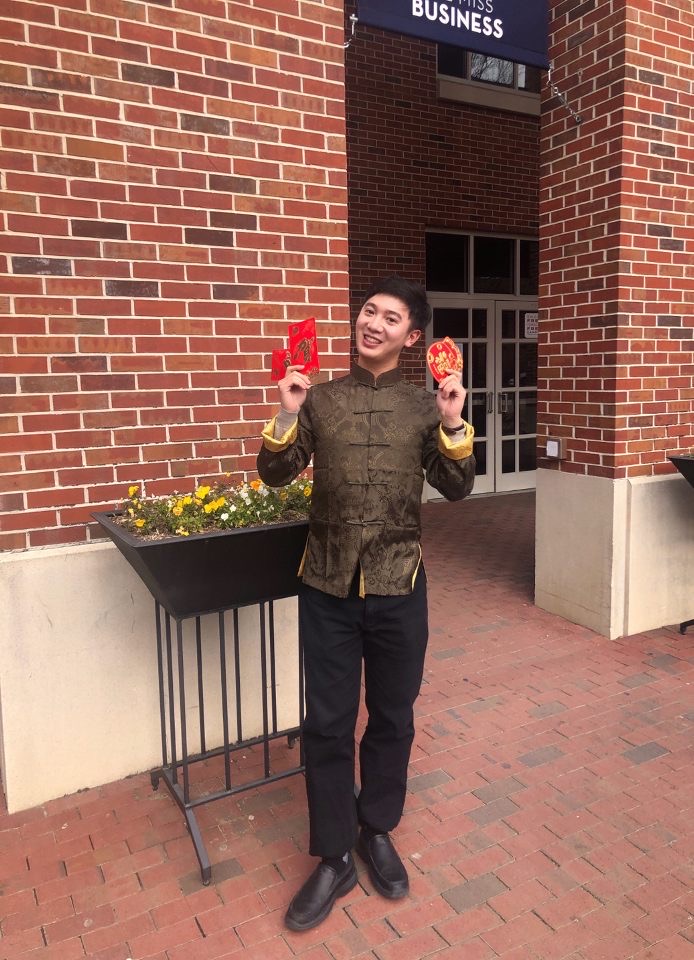With the start of the Lunar New Year, the Year of the Tiger, on Feb. 1, many students at the University of Mississippi who celebrate struggle with the difficulty of being away from their families.
The lunar calendar is based on the cycles of the moon, so the beginning of the Lunar New Year, a 15-day celebration observed throughout East Asia, varies each year. Many families take advantage of having time off to travel long distances to reunite for this special holiday.
Lunar New Year traditions typically start with a red envelope given by the elders to the children and unmarried adults of the family. The envelope contains money to convey good wishes and luck. Many people also wear red to symbolize luck and prosperity. In addition, houses and businesses are cleaned to create a fresh start.

Many families spend time together preparing traditional Chinese dishes. Some of the most common foods are dumplings (jiǎozi) and spring rolls (chūnjuǎn), as they represent hope for prosperity in the new year. Supposedly, the more dumplings one eats, the more money one will make in the new year.
One UM student struggled with celebrating the family-oriented holiday.
Three year Ph.D. student Abner Tian Zhang celebrated his Lunar New Year with a video call to his family. However, due to differences in time zones, Zhang had to offer his family best wishes 13 hours after the holiday began.
Zhang is from Mudanjiang, Heilongjiang, located in the northeast part of China, three hours away from Russia – and quite a long distance from Oxford.
“Chinese people have seven days off, but in America, they don’t celebrate Chinese New Year,” Zhang said. “So I have to work and I have to go to school. So it’s hard for me to manage the time to greet my family at the beginning of the new year.”
Zhang did invite a friend over to celebrate with him, but the family distance dampened the celebration.
The Chinese community in Mississippi, unlike those in metropolitan areas such as New York and Los Angeles, does not have many authentic Lunar New Year celebration opportunities.
Jeffrey Wang, a senior mathematics major, is a Chinese-American who has lived in Oxford for the majority of his life. Growing up, Wang participated in a lot of the Lunar New Year traditions, such as eating traditional dishes and receiving the red envelope of good luck. However, Wang also experiences difficulties in celebrating the holiday in America.
“In Mississippi the celebrations are obviously much smaller compared to back in China or even in many U.S cities with large Asian presences,” Wang said. “However celebrations within Mississippi are more tight knit as most of the time many families will come together to celebrate together instead of separately. I know of some occasions when I was younger when me and my family would celebrate with others we knew so that we could all bring in the New Year together.”
Mengjie Lin, a Chinese Flagship Instructor, said one of her biggest struggles while living in Mississippi is finding traditional food she normally prepares for the holiday.
“It’s hard to buy the food or stuff that we used to eat when we were in Taiwan,” Lin said.
Lin teaches her students the importance and traditions of the Lunar New Year in the classroom.
“We give students a red envelope and some snacks that we usually eat and we give students some Spring Festival couplets,” Lin said. “We also put a Spring Festival couplet on our door or wall and had a small hotpot party with friends and roommates.”
Like Zhang, Lin struggles with the sizable time difference when connecting with relatives in China.
“Some difficulties that arise mostly come due to time zone differences for me and my family back in China. The difference is 14 hours so calling family can be complicated sometimes,” Wang said. “Another slight difficulty is that since Lunar New Year is not celebrated in the U.S. and most of the celebrations occur on weekends for me, while in Asia (specifically China) Lunar New Year 2022 will be celebrated for 15 days. Therefore sometimes it will be hard to celebrate and eat all the dishes that are normally associated with the Lunar New Year.”
Although Lunar New Year does not look exactly the same in the U.S. as it does in other parts of East Asia, Asian Americans might be a step closer in receiving a break for this special holiday.
U.S. Rep. Grace Meng, a New York Democrat, proposed that the Lunar New Year be the 12th federal holiday. The designation of the federal holiday would allow most government employees to take the day off.















